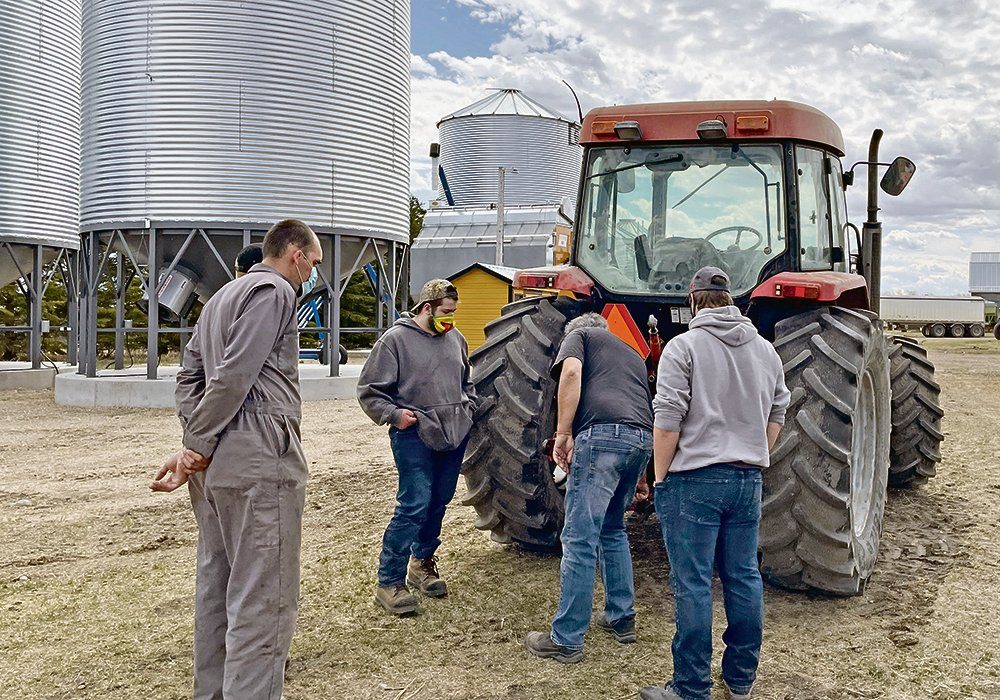Sask. college offers course for farm workers

The program introduced by Parkland College is aimed at students with little or no previous experience working on a farm
Parkland College in Yorkton, Sask., has launched a new program to address what some consider a chronic shortage of farm labourers in Western Canada.
Earlier this year, Parkland College started a pilot program called the Introduction to Farm Hand course.
The program, which offered hands-on introductory training related to farm machinery operation and general farm safety, was aimed at students who had little or no previous experience working on a farm.
The program was offered at Lemberg, Sask., over three consecutive weekends beginning April 17. A total of four students enrolled.
The program was developed after Murray Clarke, the mayor of Lemberg, Sask., approached the college following a discussion at one of Lemberg’s town meetings.
“The mayor of Lemberg actually contacted us…,” said Connie Brown, manager of business development at Parkland College.
“They felt that there was a need for this kind of farmhand training because Lemberg is a farming community and there is a labour shortage, basically.”
Brown said the program was tailored to students who have limited knowledge of farming but are interested in working on a farm.
“We didn’t want it to be too academic,” she said.
“We wanted it to be very much boots-on-the-ground, so if you know nothing about farming and you’re interested in getting a job helping someone out on a farm, here are some really basic things you need to know, with an emphasis on safety.”
Students learned about basic farm safety, hand signals, power line awareness, major field crops, GPS systems and power mobile equipment theory.
On the final weekend of the program, students got several hours of hands-on experience, operating various pieces of farm equipment including a tractor, sprayer, rock-picker and forklift.
The college is hoping to offer similar programs in the future including an introductory farmhand course that focuses on harvest safety, harvest operations and harvest machinery.
The curriculum for that program is currently under development and should be finalized later this summer, Brown said.
This is not the first time Parkland College has stepped forward to address the shortage of farm labourers in the province.
In 2014, the college developed a similar but more in-depth program called Ag Operator Training.
That course was part of a government-funded initiative, also aimed at augmenting the supply of qualified farm workers for the province’s ag sector.
Courses in that program were offered for about a year or a year-and-a-half before the initiative was shelved due to low enrolment.
A total of 17 students participated in the 2014 program but enrolment dropped to just eight people in 2015.
“The uptake was very low,” said Lyle Stewart, Saskatchewan’s agriculture minister at the time.
“We did a lot of advertising and we tried hard to get the word out, but we fell quite short of filling those classes,” he said.
Brown said Parkland’s new Introduction to Farm Hand course borrowed some material from the 2014 Ag Operator Training program, but was less in-depth.
Offering the course over three weekends allowed participants to complete the program without investing too much time and money.
Tuition fees were $695 per person.
Although only four students enrolled, the program generated a lot of interest from outside organizations, including media outlets and potential farm employers, Brown said.
“The surprising thing about it was just how much interest it got,” she said.
“We were contacted by a lot of different radio stations. There was even a company from Ontario that contacted us, so it really got a lot of attention.
“I think that tells you that there is a demand for it or that there’s something there, right? There aren’t any other programs like it right now, anywhere.
“Obviously, it has struck a chord with people.”
Parkland College is hoping to establish the program as a regular course offering.
Source: producer.com

